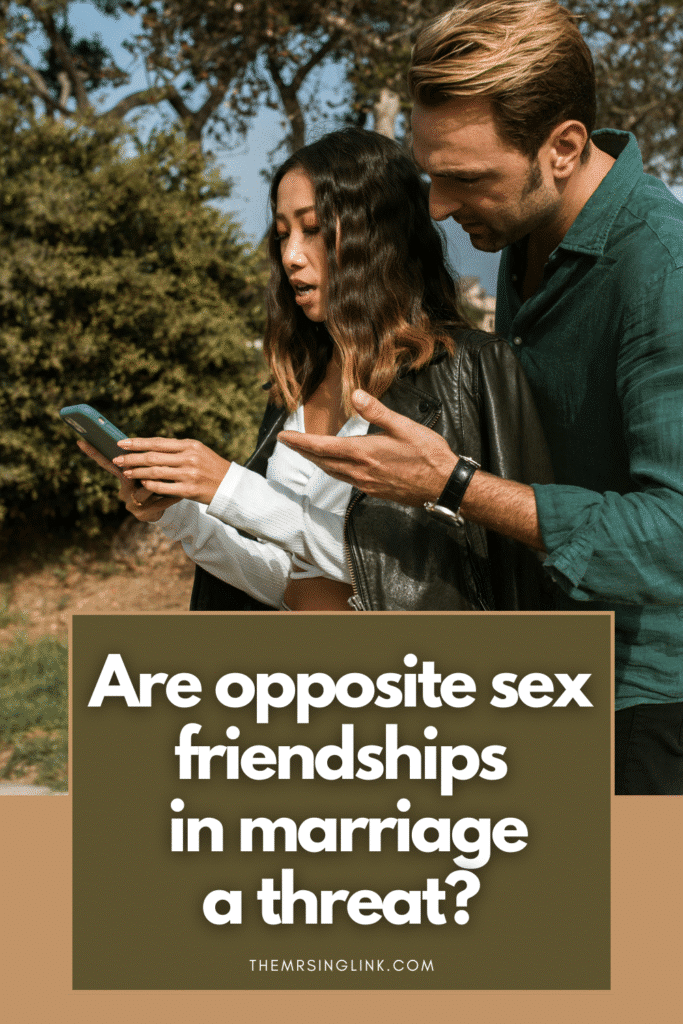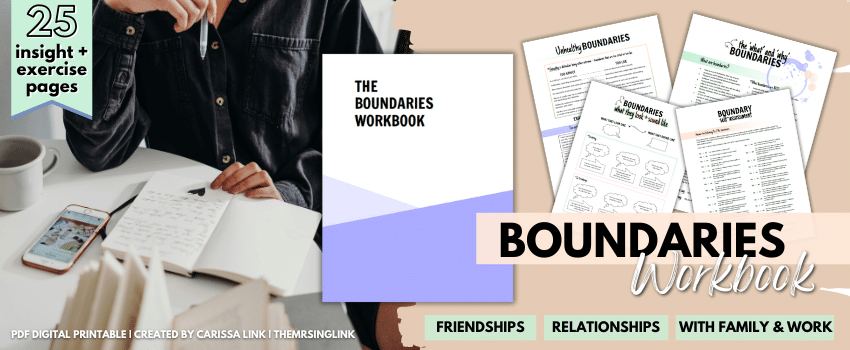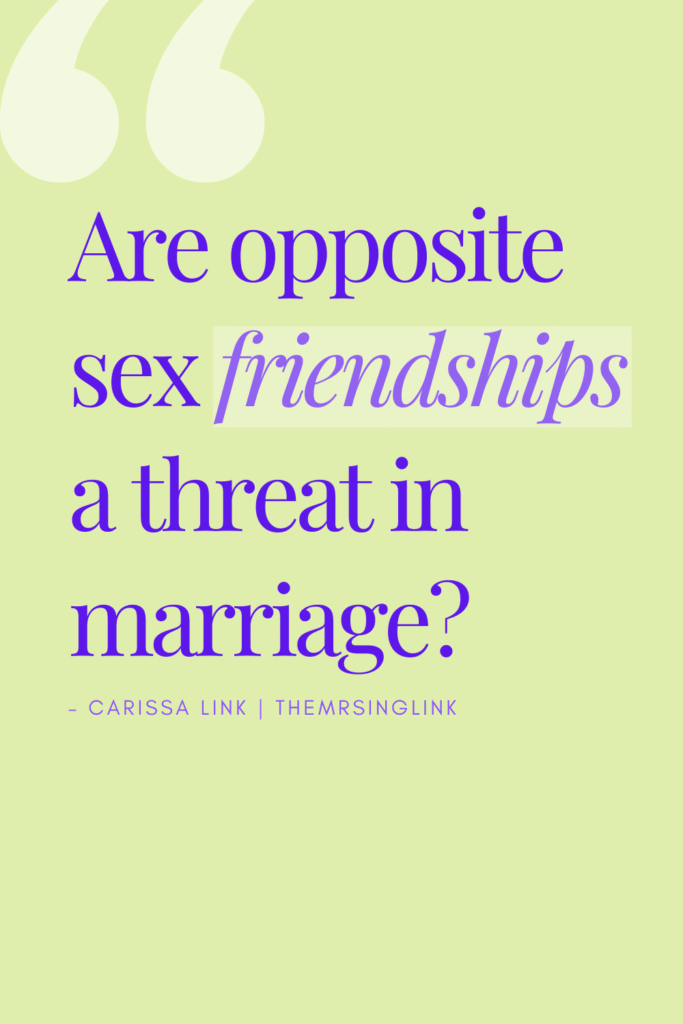Marriage, friendships, boundaries and emotional infidelity – the important questions to ask
I think the better question to ask is when, because many are quick to answer the title of this post with a big, fat, hard NO or YES. I think the answer is they can be, but what we really should be asking is at what point are opposite sex friendships in marriage a threat and therefore not worth the risk.
IMO, we don’t ask ourselves that enough, because those in grave opposition to this post typically walk around with a picket sign saying, “I can do whatever I want! I would never cheat! Marriage will not control me!“
First off, I will agree, marriage is not about control or controlling one another. No but, among many things, marriage requires self-control. And sacrifice, self-denial, uprightness, virtue and principle. If we believe marriage is without any sense of order, structure, principle, duty, and responsibility, there’s a problem.
There’s a reason it’s called marriage, yet we’ve watered it down and perverted it to suit everyone’s desires, culture, and idealistic, personalized lifestyle.
The thing is, I don’t think the majority are necessarily dying on the hill that says it’s impossible to be friends with the opposite sex, it’s that the dynamic differs from all the others (especially marriage) and that the connection should be treated accordingly and respectfully.
For instance, you likely engage and behave a certain way with your parents compared to your spouse, even if in subtlety, and it doesn’t have to be a negative. Men, you do and say things around your guy friends that you probably wouldn’t around your wife. And the same for wives with their girlfriends.
Still, with opposite sex friendships we should be willing to ask and answer certain questions that may be posing as a threat in marriage rather than washing over them in the name of unconditional freedom and innocence.

Are we willing to sacrifice?
You know, selflessness. Are we willing to do the honorable thing even if we, ourselves, benefit the least? Moreover, it’s easy to say we’re willing, but are we actually practicing it?
In marriage and relationships, alone, we really hate the term sacrifice, as if the epitome of joining our lives with someone for better or for worse til death do you part somehow doesn’t mean having to give up anything. When the truth is, you surrender your singlehood, including selfishness, when you get married because marrying someone quite literally means someone other than yourself is of higher importance and significance in your life than your personal freedoms.
Part of that sacrifice has to do with the things, people, level of connection, interactions, behaviors and environments we would normally succumb to, tolerate, entertain and normalize when marriage was not at the forefront.
Even Psychology Today offers a unique surprise in a more modern relationship culture, that decades of research say we are to check ourselves in terms of opposite sex friendships as a blind spot in marriage, and that the relinquishing or surrendering of certain freedoms is a contributing variable to ever-lasting marriages.
Nobody is saying you can’t work alongside your coworker, hang out with a friend group of both sexes, or engage at all with those of the opposite sex. In this post, we’re also not talking about the spouse who forbids interactions of any kind with the opposite sex – that would be asinine.
What is being questioned here is the ability to make certain sacrifices to honor the commitment of marriage.

Is emotional and/or sexual attraction justified as platonic?
There’s the argument as to whether people can be just friends with the opposite sex, whether they’re attracted to them or not. Personally, and I think many others would agree, there’s a difference between someone being an attractive person (in a general sense) and sexual attraction.
As a heterosexual woman, just because I may find a man attractive in general doesn’t mean it’s not possible at all for that attraction to turn sexual. In fact, general attractiveness is only a leg up.
Sure, that doesn’t guarantee an emotional connection, but infidelity doesn’t require both for it to occur. The same way people have developed physical/sexual attraction from establishing an emotional connection first, emotional attraction still paves the way for emotional infidelity.
I would love to know the statistics behind emotional affairs associated with general attractiveness versus without – I can see emotional infidelity being prominent with general attractiveness as a bare minimum, yet I can also see emotional infidelity solely exercised by itself when people desperately seek emotional validation, consolation, support and attention outside of marriage.
In other words, I think emotional infidelity is still a valid case even if there’s zero physical attraction.
So when is emotional and/or physical/sexual attraction no longer platonic, and therefore threatening to marriage? When you start having random or ruminating thoughts about having sex with them? When you equally feel guilty and giddy-happy to hear from them or texting back and forth with them throughout the day?
Now factor in that your spouse is likely unaware – do you continue justifying it as platonic simply because you haven’t acted on it, or because your spouse hasn’t sparked concern?
Is there a lack of transparency?
Transparency, as in honesty, openness and clarity. The thing is, no husband or wife is going to widely and proudly admit to one another that they find an opposite sex friend attractive. Nor will either be honky dory about feeling like they’re in a polyamorous relationship, fighting or competing for their spouse’s attention and affection. *Yes, I am speaking on behalf of monogamous relationships in this post.
Opposite sex friendships in marriage require transparency over secrecy and privacy for one reason: a guilty person will never feel comfortable sharing the things they know they shouldn’t be doing. This includes the things they know their partner wouldn’t feel comfortable with yet continue despite their partner’s feelings.
What becomes threatening to marriage is when opposite sex friendships are downplayed or kept secret. The worst part is when the concerned spouse is made to feel crazy, jealous, irrational and distrusting due to a clear and evidential lack of not only selflessness and transparency but a lack of boundaries.
Are there a lack of boundaries?
Look, it’s not that we can’t have opposite sex friendships, it’s that we’re more inclined to elevating boundless friendships over the commitment of marriage. We’re so resistant to the idea that certain friendships, or people require certain boundaries let alone the existence of boundaries to protect marriage from infidelity.
FYI, sometimes the bad guy is the person on the other side waiting and lurking for the opportune moment to break in, and if you haven’t established boundaries with the opposite sex that’s like leaving your front door unlocked. In fact, far too many people firmly believe they can go through life leaving their front door wide open then play victim to the consequences.
Boundaries aren’t meant to instill control of our partner or the marriage, they’re established for ourselves out of respect for our partner and marriage. Yet we’re a saturated culture of individuals wanting to live a life completely unrestrained and untethered.
We all have limitations on things that make us uncomfortable – in life and in marriage included. Those things might include potential risks from external sources and environments. So when your partner expresses concern about you spending one-on-one time with a friend of the opposite sex, your comfortability in openly following and Liking half-naked, female influencers on your socials, or the fact you still hang out with your friends at strip clubs, there’s legitimacy for those concerns and they should be thoughtfully considered.
It also wouldn’t be crazy to say we can become desensitized to the things, people, interactions, behaviors, environment and temptations we surround ourselves with or that we willfully vindicate.
For example, let’s say you don’t drink but you have a best friend who drinks a lot and loves to party. In a boundless friendship with this person, how likely are you to go from not drinking to having one drink but not getting drunk, to getting tipsy but “knowing your limit” and not get blackout wasted, to getting drunk “once in a while” unlike your friend who does it every weekend, then all of sudden wondering how you got to a place where you are now your friend while still holding onto the “I don’t drink” card?
Oftentimes it’s always, “I wouldn’t act on it,” as if boundaries surrounding infidelity are totally unnecessary when it comes to opposite sex friendships. Again, boundaries aren’t imposed against your spouse, they’re meant to keep you in check. That said, isn’t part of the action simply walking into the bar even though you said you wouldn’t drink? The fact is cheating on your partner doesn’t start in the bedroom, when the clothes come off or the moment P goes into the V.

Are friendships elevated above marriage?
The point being made here is whether friendship, specifically opposite sex friendships are prioritized above the marriage bond. Clear evidence of this is when there’s an imbalance of attention and affection, because these things gravitate to wherever connection abounds.
A partner that is easily distracted and engaging with a friend over text inappropriately and excessively is an example of that imbalance. Someone else – through time, effort, priority, obedience, attention and even sacrifice – is being elevated above marriage. Many despise the idea that is official grounds for emotional infidelity.
The common buzzword thrown around is that we’re encouraged to have “non-romantic” (platonic) connections outside of marriage. While I won’t disagree, I find this is often abused through vague wording and individualistic (self-focused) meaning. In addition, we back-peddle on the idea that marriage is the highest level of commitment (to someone else, in life) which requires us to keep marriage at the center.
That idea alone makes people so uncomfy, which is why the definition of marriage continues to evolve into a complimentary relationship rather than a covenantal relationship. This depreciation of commitment creates marriage fragility and, therefore, allowing external connections to puncture the entity and sacred bond of marriage.
When opposite sex friends (in fact, I should stress any connections) are elevated above marriage, they are a sure-fire threat.
